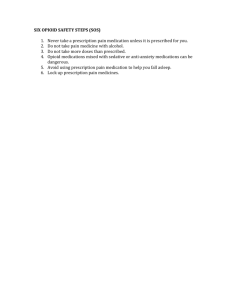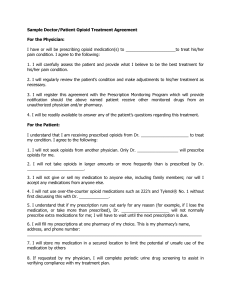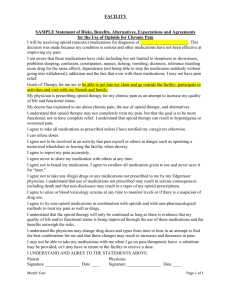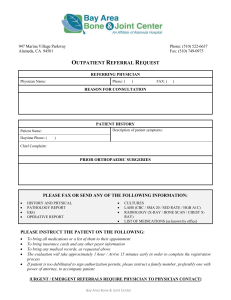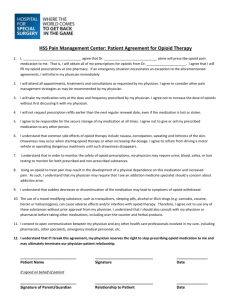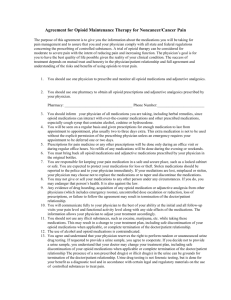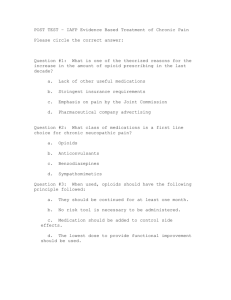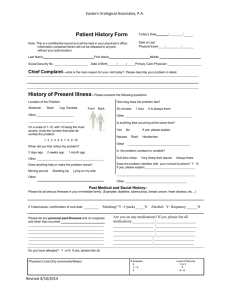AGREEMENT FOR OPIOID MAINTENANCE & THERAPY The
advertisement
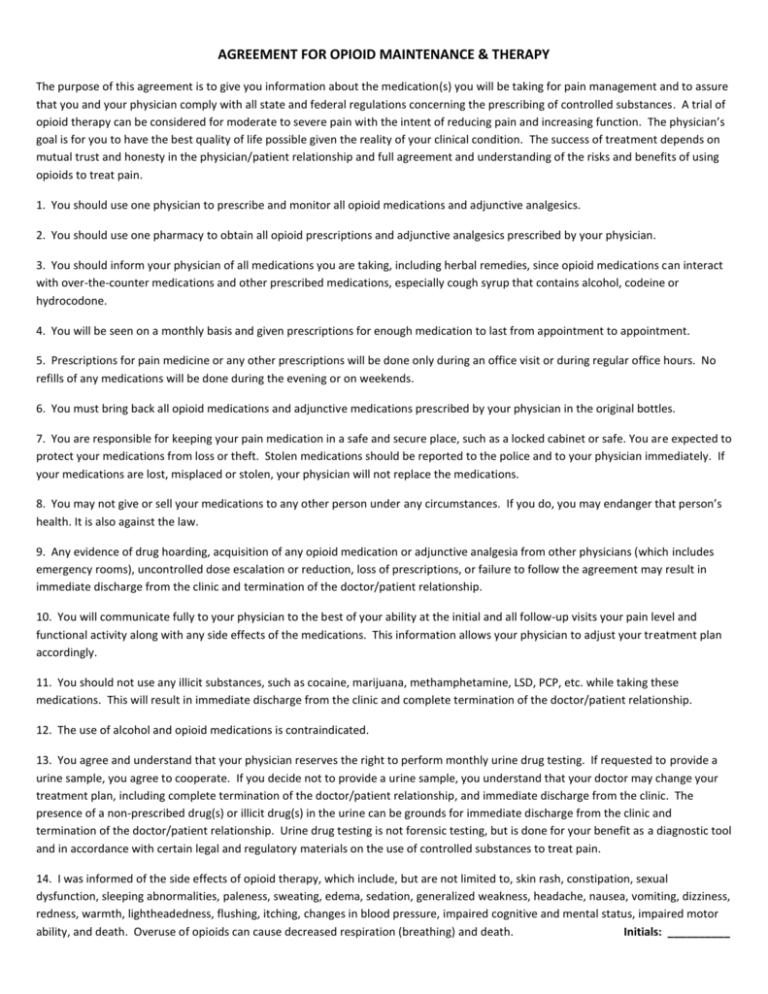
AGREEMENT FOR OPIOID MAINTENANCE & THERAPY The purpose of this agreement is to give you information about the medication(s) you will be taking for pain management and to assure that you and your physician comply with all state and federal regulations concerning the prescribing of controlled substances. A trial of opioid therapy can be considered for moderate to severe pain with the intent of reducing pain and increasing function. The physician’s goal is for you to have the best quality of life possible given the reality of your clinical condition. The success of treatment depends on mutual trust and honesty in the physician/patient relationship and full agreement and understanding of the risks and benefits of using opioids to treat pain. 1. You should use one physician to prescribe and monitor all opioid medications and adjunctive analgesics. 2. You should use one pharmacy to obtain all opioid prescriptions and adjunctive analgesics prescribed by your physician. 3. You should inform your physician of all medications you are taking, including herbal remedies, since opioid medications can interact with over-the-counter medications and other prescribed medications, especially cough syrup that contains alcohol, codeine or hydrocodone. 4. You will be seen on a monthly basis and given prescriptions for enough medication to last from appointment to appointment. 5. Prescriptions for pain medicine or any other prescriptions will be done only during an office visit or during regular office hours. No refills of any medications will be done during the evening or on weekends. 6. You must bring back all opioid medications and adjunctive medications prescribed by your physician in the original bottles. 7. You are responsible for keeping your pain medication in a safe and secure place, such as a locked cabinet or safe. You are expected to protect your medications from loss or theft. Stolen medications should be reported to the police and to your physician immediately. If your medications are lost, misplaced or stolen, your physician will not replace the medications. 8. You may not give or sell your medications to any other person under any circumstances. If you do, you may endanger that person’s health. It is also against the law. 9. Any evidence of drug hoarding, acquisition of any opioid medication or adjunctive analgesia from other physicians (which includes emergency rooms), uncontrolled dose escalation or reduction, loss of prescriptions, or failure to follow the agreement may result in immediate discharge from the clinic and termination of the doctor/patient relationship. 10. You will communicate fully to your physician to the best of your ability at the initial and all follow-up visits your pain level and functional activity along with any side effects of the medications. This information allows your physician to adjust your treatment plan accordingly. 11. You should not use any illicit substances, such as cocaine, marijuana, methamphetamine, LSD, PCP, etc. while taking these medications. This will result in immediate discharge from the clinic and complete termination of the doctor/patient relationship. 12. The use of alcohol and opioid medications is contraindicated. 13. You agree and understand that your physician reserves the right to perform monthly urine drug testing. If requested to provide a urine sample, you agree to cooperate. If you decide not to provide a urine sample, you understand that your doctor may change your treatment plan, including complete termination of the doctor/patient relationship, and immediate discharge from the clinic. The presence of a non-prescribed drug(s) or illicit drug(s) in the urine can be grounds for immediate discharge from the clinic and termination of the doctor/patient relationship. Urine drug testing is not forensic testing, but is done for your benefit as a diagnostic tool and in accordance with certain legal and regulatory materials on the use of controlled substances to treat pain. 14. I was informed of the side effects of opioid therapy, which include, but are not limited to, skin rash, constipation, sexual dysfunction, sleeping abnormalities, paleness, sweating, edema, sedation, generalized weakness, headache, nausea, vomiting, dizziness, redness, warmth, lightheadedness, flushing, itching, changes in blood pressure, impaired cognitive and mental status, impaired motor ability, and death. Overuse of opioids can cause decreased respiration (breathing) and death. Initials: __________ 15. Physical dependence and/or tolerance can occur with the use of opioid medications. Physical dependence means that if the opioid medication is abruptly stopped or not taken as directed, a withdrawal symptom can occur. This is a normal physiological response. The withdrawal syndrome could include, but not exclusively, sweating, nervousness, abdominal cramps, diarrhea, goose bumps, and alterations in one’s mood. It should be noted that physical dependence does not equal addiction. One can be dependent on insulin to treat diabetes or dependent on prednisone (steroids) to treat asthma, but one is not addicted to the insulin or prednisone. Addiction is a primary, chronic neurobiologic disease with genetic, psychosocial and environmental factors influencing its development and manifestation. Addiction is characterized by behavior that includes one or more of the following: impaired control over drug use, compulsive use, continued use despite harm, and cravings. This means the drug decreases one’s quality of life. Tolerance means a state of adaptation in which exposure to the drug induces changes that result in diminution of one or more of the drug’s effects over time. The dose of the opioid may have to be titrated up or down to a dose that produces maximum function and a realistic decrease of the patient’s pain. 16. If you have a history of alcohol or drug misuse/addiction, you must notify the physician of such history since the treatment with opioids for pain may increase the possibility of relapse. A history of addiction does not, in most instances, disqualify one for opioid treatment of pain, but starting or continuing a program for recovery is a must. 17. You agree to allow your physician to contact any health care professional, family member, pharmacy, legal authority, or regulatory agency to obtain or provide information about your care or actions if the physician feels it is necessary. 18. You agree to a family conference or a conference with a close friend or significant other if the physician feels it is necessary. 19. I am of sound mind, body, thought, and judgment and I understand and am fully aware that taking more than my prescribed dosage(s) of my prescribed medication(s) at any time and/or combining my medication(s) with other substances such as alcohol, illicit drugs, and/or other prescribed and/or non-prescribed medication(s) may result in overdose, morbidity, mortality, and/or death. Therefore, in the event of my untimely death, morbidity and/or mortality due to overdosing and/or non-therapeutic and/or nonprescribed combining of my prescription medication(s), I do hereby absolve, acquit, exculpate, exonerate, indemnify, release, and hold harmless Deno B. Barroga, MD, MPH, the Texas Center for Physical Medicine & Rehabilitation, Deno B. Barroga, MD, MPH & Associates, his staff, employees, and any and all associated entities from any and all, but not limited to, adverse legal actions and judgments, accusations, admonitions, allegations, appeals, arbitrations, arraignments, arrests, captivities, citations, claims, collections, complaints, condemnations, confinements, convictions, court orders, court trials, criminal charges, criticisms, damages, deliberations, depositions, detainments, detentions, disciplinary actions, fees, fines, forfeitures, grievances, imprisonments, incarcerations, incriminations, indictments, investigations, judicial proceedings, legal cases, legal disputes, legal proceedings, legal restraints (custody), liabilities, litigations, mediations, objections, penalties, probations, prosecutions, protests, punishments, reprimands, retrials, sanctions, sentencings, settlements, subpoenas, summons, suspensions, trials by jury, unfavorable verdicts, warrants, and lawsuits (malpractice and otherwise). This includes any and all, but not limited to, actions taken by the Texas Medical Board (TMB), the Drug Enforcement Agency (DEA), the Federal Bureau of Investigation (FBI), the Department of Justice (DOJ), the Internal Revenue Service (IRS) Criminal Investigation Division, the United States Attorney's Office, the Office of the Attorney General (OAG), the District Attorney’s Office (DA), the Dallas Police Department (DPD), the Sheriff’s Department, the Food and Drug Administration (FDA) Office of Criminal Investigations (OCI), the Department of Health and Human Services (DHHS) Office of the Inspector General (OIG), the Texas Department of Public Safety (DPS), the Office of the Medical Examiner, the Center for Disease Control (CDC), the Central Intelligence Agency (CIA), and any and all federal, state, local, and government administrations, agencies, authorities, branches, bureaus, centers, departments, divisions, entities, establishments, institutions, offices, organizations, powers, regulatory bodies, sections, sectors, and units. The above agreement has been explained to me by Deno B. Barroga, MD, MPH. I agree to its terms so that Deno B. Barroga, MD, MPH can provide quality pain management using opioid therapy to decrease my pain and increase my function. I have received a copy of this agreement. Patient Name (Print): ____________________________________________________________________________________________ Patient Signature: ______________________________________________________________________ Date: ___________________ Witness Signature: _____________________________________________________________________ Date: __________________
